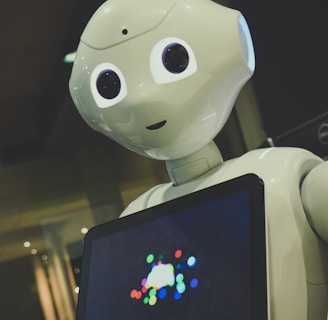Artificial Intelligence: A Double-Edged Sword - Navigating the Ethical and Societal Implications
12/3/20234 min read


Introduction
Artificial Intelligence (AI) has become an integral part of our lives, revolutionizing industries and transforming the way we live and work. From self-driving cars to virtual assistants, AI has made significant advancements in recent years. However, with these advancements come ethical and societal implications that need to be carefully considered and navigated. In this blog post, we will explore the double-edged sword of AI and discuss the importance of addressing its ethical and societal impact.
The Power of AI
Artificial Intelligence refers to the development of computer systems that can perform tasks that would normally require human intelligence. These systems are capable of learning, reasoning, and problem-solving, often surpassing human capabilities in terms of speed and accuracy. The power of AI lies in its ability to analyze vast amounts of data, identify patterns, and make predictions, enabling businesses to make more informed decisions and improve efficiency.
AI has already made significant contributions in various fields, including healthcare, finance, and transportation. In healthcare, AI algorithms can assist in diagnosing diseases, predicting patient outcomes, and developing personalized treatment plans. In finance, AI-powered algorithms can analyze market trends and make investment recommendations. In transportation, AI is driving the development of autonomous vehicles, promising safer and more efficient transportation systems.
The Ethical Dilemma
While the potential benefits of AI are undeniable, it also raises ethical concerns that need to be addressed. One of the primary ethical dilemmas associated with AI is the issue of privacy and data protection. AI systems rely on vast amounts of data to function effectively, and this data often includes personal and sensitive information. There is a need to ensure that this data is collected and used in a responsible and secure manner, with proper consent and transparency.
Another ethical concern is the potential for bias and discrimination in AI algorithms. AI systems are trained on existing data, which may contain biases and prejudices. If these biases are not addressed, AI systems can perpetuate and amplify existing inequalities and discrimination. It is crucial to ensure that AI algorithms are fair, transparent, and accountable, with mechanisms in place to detect and mitigate bias.
Furthermore, the impact of AI on employment is another ethical consideration. While AI has the potential to automate repetitive and mundane tasks, it also raises concerns about job displacement and unemployment. It is essential to create a balance between the benefits of AI automation and the preservation of human employment, ensuring that individuals are equipped with the necessary skills to adapt to the changing job market.
Societal Implications
In addition to the ethical concerns, AI also has significant societal implications that need to be carefully navigated. One of the key concerns is the potential for AI to exacerbate existing social inequalities. AI systems are only as good as the data they are trained on, and if the data is biased or limited, it can lead to unequal outcomes. For example, if AI algorithms are trained on data that predominantly represents one gender or race, it can result in biased decision-making and perpetuate existing inequalities.
Another societal implication of AI is the erosion of privacy and the potential for surveillance. AI systems can collect and analyze vast amounts of personal data, raising concerns about the misuse and abuse of this information. There is a need for robust privacy regulations and safeguards to protect individuals' rights and ensure that AI is used responsibly and ethically.
Furthermore, the impact of AI on human relationships is another societal consideration. As AI becomes more integrated into our daily lives, there is a risk of social isolation and a loss of human connection. It is essential to strike a balance between the convenience and efficiency that AI provides and the need for human interaction and emotional connection.
Navigating the Way Forward
Addressing the ethical and societal implications of AI requires a multi-stakeholder approach. It is crucial for governments, industry leaders, researchers, and the public to come together and develop frameworks and guidelines that ensure the responsible and ethical development and use of AI.
First and foremost, there is a need for robust regulatory frameworks that govern the collection, use, and protection of data. These frameworks should prioritize privacy and security, ensuring that individuals have control over their personal information and that AI systems are transparent in their data usage.
Secondly, the development of AI algorithms should be guided by ethical principles. This includes addressing bias and discrimination, ensuring fairness and accountability, and promoting transparency in decision-making processes. AI systems should be designed to augment human capabilities rather than replace them, with a focus on human-centered design and the preservation of human values.
Education and awareness also play a crucial role in navigating the ethical and societal implications of AI. It is essential to equip individuals with the knowledge and skills to understand and engage with AI technology. This includes promoting digital literacy, fostering critical thinking, and encouraging ethical decision-making in the use of AI.
Conclusion
Artificial Intelligence has the potential to revolutionize our world, but it also comes with ethical and societal implications that need to be carefully considered and addressed. By navigating these challenges, we can harness the power of AI while ensuring that it is used responsibly, ethically, and for the benefit of all. It is only through a collective effort that we can shape the future of AI in a way that aligns with our values and aspirations as a society.
Contacts
hksvvv@gmail.com
